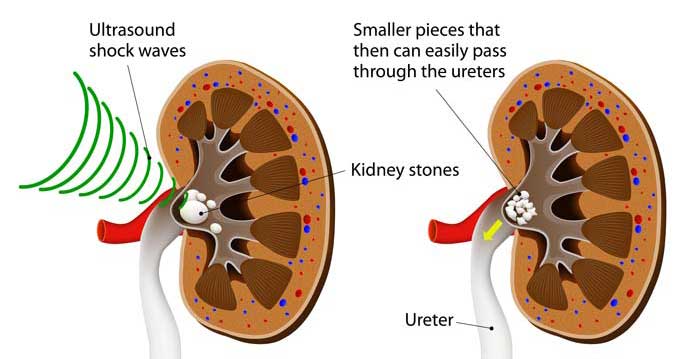Extracorporeal Shock Wave Lithotripsy (ESWL)
Overview
At Indotaj Medical Center in Tajikistan, we offer Extracorporeal Shock Wave Lithotripsy (ESWL) as a common and nonsurgical procedure for the effective treatment of kidney stones. This innovative technique involves the use of high-energy shock waves to break up kidney stones, facilitating the passage of small stone fragments through the urinary tract, leading to their natural elimination from the body.
Kidney stones, solid formations that develop due to elevated levels of certain substances, such as calcium, in the urine, typically form within the kidneys but can migrate into the ureters, the tubes responsible for transporting urine to the bladder.
While many kidney stones can pass spontaneously through the urinary tract and be expelled during urination, larger stones may become obstructed, causing intense pain during a “kidney stone attack.” This discomfort is often a result of a stone becoming lodged in the ureter, impeding the normal flow of urine from the kidney.
ESWL, performed at Indotaj Medical Center, proves to be an effective solution by dislodging stones, allowing for their passage through the urinary system without the need for invasive surgery. Our dedicated medical professionals prioritize your comfort and well-being throughout the ESWL procedure, providing comprehensive care to ensure a successful outcome.

Why it's done
Stone Size: ESWL is typically most effective for treating smaller stones.
Stone Location: The precise location of the stone within the urinary tract is considered in determining the suitability of ESWL.
Health Conditions and Medications: Your overall health and any regular medications you take are important considerations, as they can impact the success of the ESWL procedure.
Body Type: Anatomical differences play a role, as they may affect the distance between the stone and the shock waves. Variations in body type can influence the effectiveness of ESWL.
Risk
- Blockage in your ureter.
- Bleeding.
- Infection.
How do I get ready for extracorporeal shock wave lithotripsy (ESWL)?
- Blood or Urine Tests: Prior to the procedure, blood tests to assess kidney function and blood counts, as well as urine tests to detect urinary tract infections (UTIs), may be conducted.
- Medication Review: Discuss and review your medications with our healthcare providers. Continue taking all prescribed medications unless advised otherwise. Certain medications, such as warfarin or other blood-thinning agents, may need to be temporarily discontinued to reduce the risk of bleeding associated with the procedure.
- Fasting Instructions: In preparation for the procedure, you may be required to refrain from eating and drinking for several hours. Specific guidelines will be provided based on the type of procedure and anesthesia requirements.
- Post-Procedure Transportation: Arrange for a companion to drive you home after the procedure, especially if sedation or anesthesia is administered. Ensuring a safe and comfortable transition after your medical care is a priority at Indotaj Medical Center.


